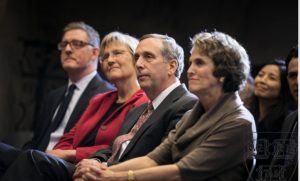 Powerful internal and external forces have helped shape the Harvard’s Defeating Malaria: From the Gene to the Globe Initiative. The legacy of Drew Faust, Harvard’s 28th President, to improve the state of global health knowledge, education, and capacity building at the university is a continued focus of newly inaugurated Harvard President Lawrence Bacow. In 2018, he said, “to focus on the world’s great global health challenges represents a search for truth, a willingness to do things differently and to try and generate new ideas and new solutions.”
Powerful internal and external forces have helped shape the Harvard’s Defeating Malaria: From the Gene to the Globe Initiative. The legacy of Drew Faust, Harvard’s 28th President, to improve the state of global health knowledge, education, and capacity building at the university is a continued focus of newly inaugurated Harvard President Lawrence Bacow. In 2018, he said, “to focus on the world’s great global health challenges represents a search for truth, a willingness to do things differently and to try and generate new ideas and new solutions.”
History
Over the past 100 years and today—breakthrough ideas from the Harvard community have helped advance our understanding of malaria. Harvard’s involvement in malaria dates back to the Harvard Expedition of the 1920s where malaria was documented and studied in Liberia and the Belgian Congo. In the 1940s, Harvard chemists worked on the chemical synthesis of quinine, the first anti-malarial drug. More recently, in 1997, the Harvard Malaria Initiative was established as a partnership of academics, governmental agencies, and private companies, including the ExxonMobil Foundation and others, working to wipe out the disease worldwide. The effort was initially geared toward accelerating basic scientific research on disease mechanisms in malaria, genomic aspects of malaria research, and using findings to discover and develop new drug and vaccine therapies for the disease.
Today, Harvard’s Defeating Malaria: From the Genes to the Globe Initiative expands beyond fundamental biomedical research, recognizing that an integrated multidisciplinary, multi-sectoral approach, with coordination and communication across fields and sectors, is the best strategy to achieve long-term success in controlling and eliminating malaria and its broad social consequences.
With support from the ExxonMobil Foundation, Harvard Business School, and the Harvard Institute for Global Health, faculty from across the University joined together in January 2011 to convene two unprecedented multidisciplinary, multi-sectoral events—Rethinking Malaria: A Leadership Forum and Rethinking Malaria: The Science of Eradication Symposium.
The two-day Rethinking Malaria: Leadership Forum was sponsored and co-organized by Professor Michael Porter of the Harvard Business School, Professor Paul Farmer of the Harvard Medical School, and Professor Dyann Wirth of the Harvard T.H. Chan School of Public Health. The Rethinking Malaria: Leadership Forum challenged participants to critically examine current structures, incentives, and implementation processes and to identify strategies for addressing the obstacles to the elimination and eradication of malaria.
In addition to bringing together faculty from across the university to discuss how diverse areas of expertise could be brought to bear on the problem malaria, the forum served as a ‘call to arms’ for members of the malaria community to develop new approaches for collaboration and partnership; to examine global governance issues; to identify and borrow technologies from other areas of basic and applied research; to help foster new financial models, training mechanisms and previously untapped skill sets; and to harmonize health services and cross-training of the healthcare workforce to eradicate malaria.
A public symposium called, Rethinking Malaria: The Science of Eradication, emphasized the need to refocus on new research priorities due to the complex life cycle of the disease, as well as the need for multi-pronged collaborative efforts and strategies to achieve the goal of long-term elimination and eradication. The symposium combined lessons learned from past malaria efforts, underscored key challenges, such as the resurgence of the disease due to complacency in prevention and control, and discussed new opportunities to eradication this ancient scourge.
The highly successful leadership forum catalyzed a series of subsequent deliberations among faculty from across the University about the unique role Harvard could play in the fight against malaria—with a specific focus on the nexus between the most important 21st-century challenges and the areas in which Harvard could uniquely contribute. Further discussions with the UN Special Envoy’s Office, stakeholders from the global malaria community, and thought leaders from the global health community helped to progressively shape the University’s Defeating Malaria Initiative, bringing it in full alignment with Harvard’s broader set of global public health priorities.